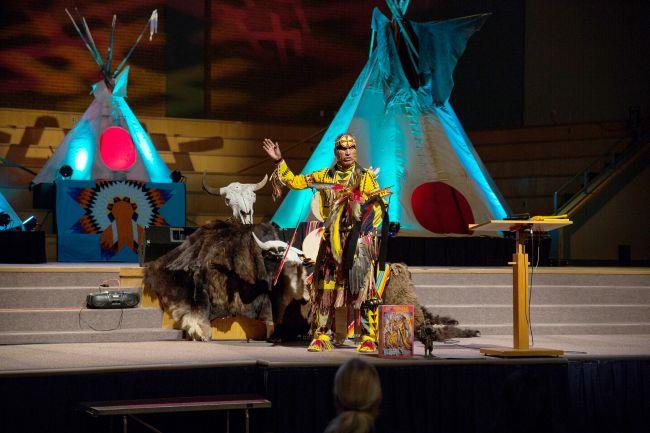Creating Trust and Knowledge

Dr. Terry LeBlanc says respect and education is essential for mutual respect
Understanding perspective and gaining knowledge are essential to being informed, according to Dr. Terry LeBlanc.
"You can't journey with people if you don't know who they are," he said. "Taking the time to know us, not just as a story or as a place or as a location ... it will help you a great deal."
LeBlanc was in Caronport this week for Aboriginal Awareness Week. Along with other Canadian Aboriginal leaders, he took part in a talking circle to discuss how to improve the relationship between Aboriginal cultures and the media. LeBlanc is the founding chair and current director of indigenous pathways and director of the North American Institute for Indigenous Theological Studies.
"How well do you know Treaty 4? Do you know the treaty? Have you ever read it? So that immediately disadvantages you," said LeBlanc. "So if you understand enough of the history of this land with respect to Aboriginal people and those kinds of things, then you'll be far better prepared when something emerges."
He added that a lot of comments from the general public in response to Aboriginal stories are framed in the context of "That was then this is now" or "It didn't happen on my watch."
"Usually a lot of comments are, 'Just get over it,'" added Daniel Stonechild, who was a student at Caronport High School and is now attending First Nations University in Regina.
"You can't just get over it and so becoming familiar with these things, understanding the relationship we had before and all these kinds of things, that definitely would put things in perspective and context."
LeBlanc said there are several things that people can do to help shape understanding despite not necessarily being involved in government or the policies that originally shaped residential schools.
"It may not have happened on your watch, but you're the beneficiaries of what did happen," said LeBlanc. "My dad who fought in the Second World War comes back, is no longer an Indian under the Indian Act because of legislation, but he's not entitled to veterans' benefits like our other veterans because he's an Indian.
"That's a legislative policy, so the people whose fathers or grandfathers did obtain veteran benefits are beneficiaries of something that took place that I'm not the beneficiary of."
He added people also should remember to take action now.
"While it didn't happen on your watch you can take action today to stop doing what was done. Change your attitude, learn why it was done, learn how it was done, learn what the consequences of having done it for a few hundred years were and then stop doing those things," said LeBlanc.
"So if you want to be reconciled, stop doing what you did. Stop trying to eradicate our treaties with British ground and federal government. Stop trying to extinguish our rights that are guaranteed to us under the 1982 Constitution Act."
The larger context for students
Michael Pawelke, president at Briercrest College and Seminary, hopes his students walk away more informed at the end of Aboriginal Awareness Week.
"Truth has power. Confession has power. Forgiveness has power and as we understand where we come from, what we need to do today, that's going to equip us better for how we'll move forward in terms of building trust and relationships in the future," he said.
"So we want our students to understand but also have their own personal commitment in making sure that we learn from our past and live differently in our future."
He added that helping students understand present cultural context as well as historical context would help with how to reconcile as communities, as individuals and as nations.
"Certainly prejudice and discrimination has always been and is ever around us and understanding and education will help dispel some of that. Values will also dispel that and so we work hard at helping our students think differently about how we view one another," said Pawelke.
However, he said the intent goes beyond getting students to change how they think.
"It's about having them take these values and these beliefs into whatever kind of context that God puts them and be an agent of influence in that setting as well," said Pawelke. "It's not just been about current issues as significant and as tragic as they are, but it's given them a larger context to understand where we've come from and therefore where we need to go in the future."
Written by: Lisa Goudy @lisagoudy
Article from Moose Jaw Times Herald http://www.mjtimes.sk.ca/News/Local/2016-03-10/article-4462680/Creating-trust-and-knowledge/1
